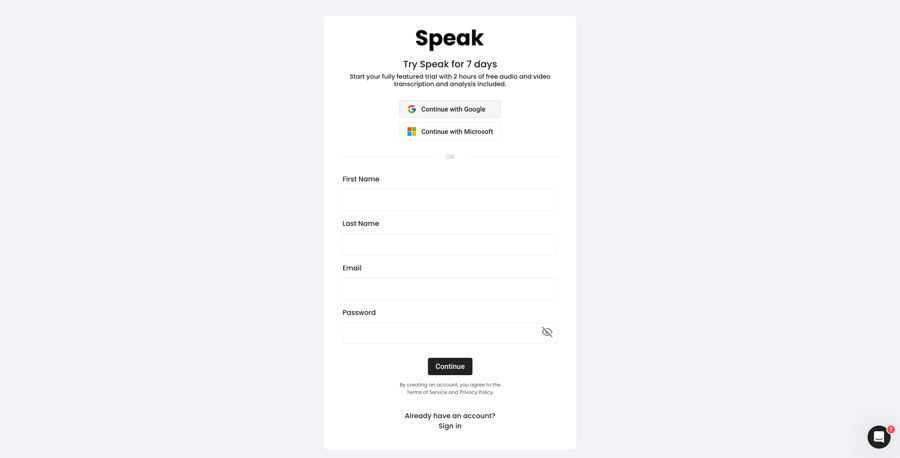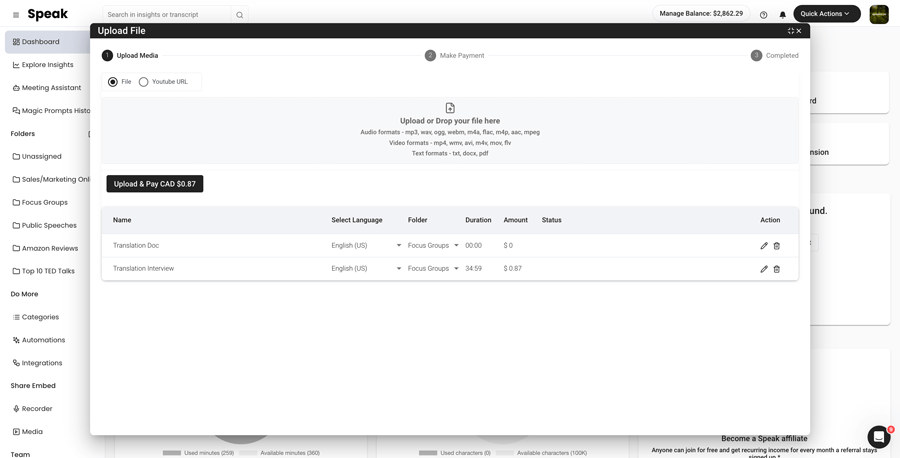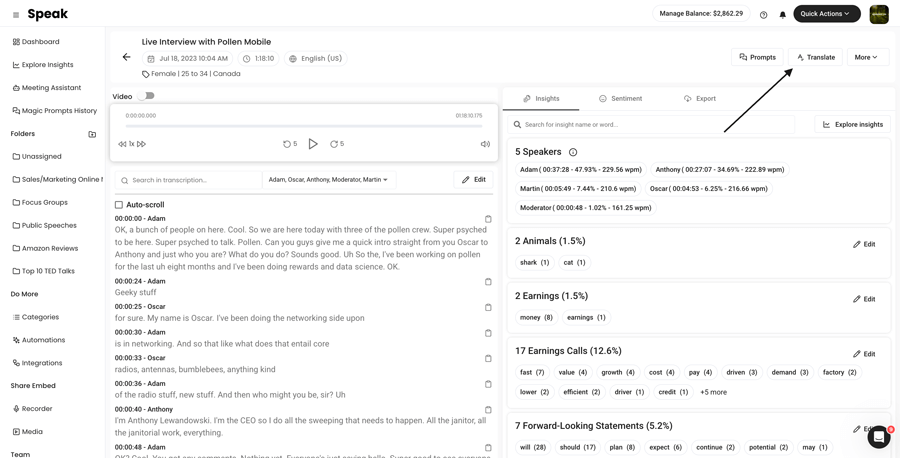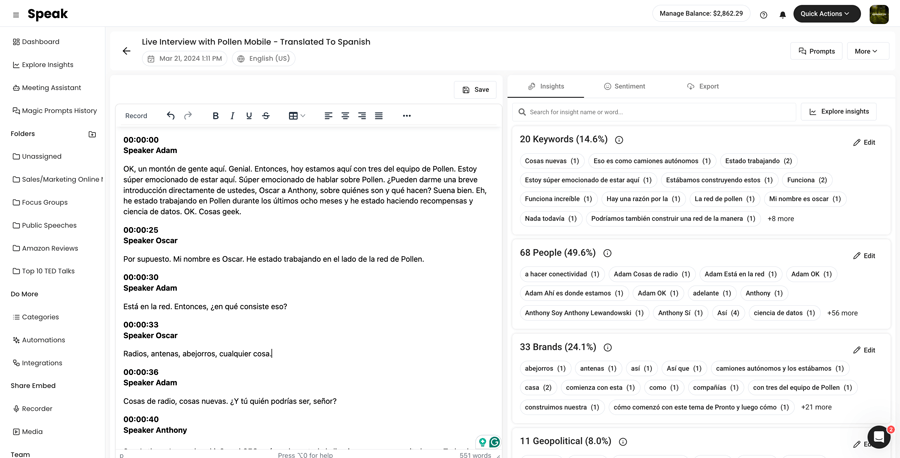How To Translate Japanese to Uzbek
Translating Japanese to Uzbek is super simple!

Step 1: Register for Speak
Register for Speak using this link.
Once you register, you can instantly begin translating your Japanese to Uzbek file(s).

Step 2: Upload Your Japanese file(s)
As soon as you log in, you will be redirected to the dashboard.
Once there, you can select the Quick Action "New Upload".
In Speak, you can seamlessly upload, transcribe and translate audio, video and text files all at once!

Step 3: Translate Your Japanese file(s) to Uzbek
Once the file is uploaded, simply visit your file and select "Translate".
If it is an audio and video file, Speak will ask you if you want to keep the speaker names and timestamps in the translation.
Want to translate many files at once? No problem!
You can view the files you want to automatically translate from Japanese to Uzbek from the folder level and instantly translate as many files as you need with our artificial intelligence translation in just a few clicks.

Step 4: That's It! View, Analyze, Modify & Export Your New Uzbek file(s)
Once the translation is done, you will be alerted and you will see a new document in the same folder your original file is in.
The file will be named the same but with a dash indicating that it is the translated version.
Need support with your Japanese translation?
We are always here and happy to help at Speak!
Just send us a message on live chat on the bottom right corner and we will ensure you are set up for success.
Interested in translating Japanese or other languages to different languages? View our entire list of supported translation languages here.
Automatic, accurate, instant AI translation from Japanese to Uzbek is here for you.
Register for Speak using this link and begin translating Japanese to Uzbek today.
The Revolutionary Leap in Language Translation: From Japanese to Uzbek
In today's interconnected world, the ability to communicate across linguistic barriers is invaluable. Whether you're expanding your business, conducting research, or simply exploring new cultures, breaking down these barriers opens up a world of opportunities. With the rise of AI translation technologies, like those developed by Speak Ai, translating languages such as Japanese to Uzbek has become more seamless, intuitive, and efficient than ever before.
Bridging Cultures: The Significance of Japanese to Uzbek Translation
The realms of business, academia, and tourism are just a few areas where the power of language translation from Japanese to Uzbek can be fully realized. For businesses looking to enter Uzbek markets or foster partnerships in Japan, language is the key to building trust and understanding. Researchers benefit from translated documents to contribute valuable knowledge and insights across linguistic boundaries. Likewise, tourists and cultural explorers gain from translations that make navigations and interactions enriching and more authentic.
Embracing AI for Hassle-Free Translations
Speak Ai, leveraging advanced NLP and transcription software, offers an agile solution for translating audio, video, and text from Japanese to Uzbek. The integration of generative AI into Speak Ai's platform enhances accuracy, context understanding, and the overall quality of translations, making it a potent tool for various users, including researchers and businesses.
The Edge of Automatic Japanese to Uzbek Translation
- Time and Cost Efficiency: Automated translations significantly reduce the time and financial resources required for translations, making it feasible to translate large volumes of content quickly.
- Enhanced Accuracy: With continuous learning algorithms, Speak Ai’s translation tools improve over time, reducing errors and enhancing the reliability of translations.
- Accessibility: The easy-to-use interface of Speak Ai’s platform ensures that high-quality translations are accessible to anyone, regardless of their technical proficiency.
The Plus of Speak Ai in Language Translation
With a 4.9 rating on G2 and a user base exceeding 150K, Speak Ai stands out as a leader in AI-assisted language translation. The AI Meeting Assistant feature is a game-changer for businesses and researchers who require real-time transcription and translation during meetings on platforms like Microsoft Teams, Zoom, Google Meet, and Webex. Moreover, the integrated large language models offer automatic analysis, empowering users with insights derived from translated content.
Exploring the Paths: Japanese and Uzbek Languages in Focus
Discovering the Landscape: Japanese and Uzbek Popularity
Japanese, the primary language of Japan, is spoken by over 128 million people, infusing rich history and culture into its dialects. Uzbek, the official language of Uzbekistan, is spoken by approximately 32 million people. It is a Turkic language that serves as a crucial communication medium in Central Asia, reflecting the region’s vibrant history and cultural diversity.
The Fascinating World of Japanese and Uzbek
Japanese boasts a complex writing system comprising Kanji, Hiragana, and Katakana, reflecting its layered cultural history. Uzbek, having transitioned from Arabic to Latin and then to Cyrillic scripts through time, showcases its historical interactions and changes. An interesting fact about Japanese is its honorifics system, significantly altering speech based on social standing, an aspect not prevalent in Uzbek. On the other hand, Uzbek is known for its extensive usage of proverbs and sayings, enriching everyday conversations with wisdom and traditional values.
Unity and Diversity: Japanese and Uzbek Compared and Contrasted
Despite their distinct origins, Japanese and Uzbek share the commonality of shaping communal identity and cultural norms through language. While Japanese relies heavily on context and subtlety, Uzbek is more direct but embellished with poetic nuances. Both languages offer unique challenges and fascinations for linguists and language enthusiasts alike, embodying the diversity and unity in the human ability to communicate and connect.
Speak Ai: Your Companion in Breaking Language Barriers
The journey from Japanese to Uzbek is more than just translating words; it's about conveying meaning, context, and culture. With Speak Ai, individuals, researchers, and businesses can navigate this journey effortlessly. The integration of cutting-edge AI technologies ensures that every translation is not just accurate but also retains the nuances of both languages. In an era where globalization and access to information are key, Speak Ai stands as your reliable partner in crossing linguistic frontiers, fostering understanding, and unlocking countless possibilities.
Embark on your journey of discovery, enrichment, and connection with Speak Ai’s Japanese to Uzbek translation services. Experience the true essence of communication without boundaries.
Start your journey with Speak Ai today and transform the way you communicate across languages.
Connect with us to explore how our AI-powered translation solutions can propel your business, research, or cultural explorations forward. Let us help you transcend language barriers with ease and efficiency.
Translate Japanese To These Other Supported Languages:
- Translate Japanese-to-Albanian
- Translate Japanese-to-Amharic
- Translate Japanese-to-Arabic (Egypt)
- Translate Japanese-to-Arabic (Iraq)
- Translate Japanese-to-Arabic (Israel)
- Translate Japanese-to-Arabic (Jordan)
- Translate Japanese-to-Arabic (Kuwait)
- Translate Japanese-to-Arabic (Lebanon)
- Translate Japanese-to-Arabic (Oman)
- Translate Japanese-to-Arabic (Palestinian Authority)
- Translate Japanese-to-Arabic (Qatar)
- Translate Japanese-to-Arabic (Saudi Arabia)
- Translate Japanese-to-Arabic (Syrian Arab Republic)
- Translate Japanese-to-Arabic (United Arab Emirates)
- Translate Japanese-to-Arabic Modern Standard (Bahrain)
- Translate Japanese-to-Armenian
- Translate Japanese-to-Azerbaijani
- Translate Japanese-to-Bengali
- Translate Japanese-to-Bosnian
- Translate Japanese-to-Bulgarian
- Translate Japanese-to-Catalan
- Translate Japanese-to-Chinese (Cantonese, Traditional)
- Translate Japanese-to-Chinese (Simplified)
- Translate Japanese-to-Chinese (Traditional)
- Translate Japanese-to-Croatian
- Translate Japanese-to-Czech
- Translate Japanese-to-Danish
- Translate Japanese-to-Dari
- Translate Japanese-to-Dutch
- Translate Japanese-to-English
- Translate Japanese-to-English (Australia)
- Translate Japanese-to-English (India)
- Translate Japanese-to-English (Ireland)
- Translate Japanese-to-English (New Zealand)
- Translate Japanese-to-English (Scottish)
- Translate Japanese-to-English (South African)
- Translate Japanese-to-English (United Kingdom)
- Translate Japanese-to-English (United States)
- Translate Japanese-to-Estonian
- Translate Japanese-to-Farsi (Persian)
- Translate Japanese-to-Finnish
- Translate Japanese-to-French
- Translate Japanese-to-French (Canada)
- Translate Japanese-to-Georgian
- Translate Japanese-to-German
- Translate Japanese-to-German (Swiss)
- Translate Japanese-to-Greek
- Translate Japanese-to-Gujarati
- Translate Japanese-to-Haitian Creole
- Translate Japanese-to-Hausa
- Translate Japanese-to-Hebrew
- Translate Japanese-to-Hindi
- Translate Japanese-to-Hungarian
- Translate Japanese-to-Icelandic
- Translate Japanese-to-Indonesian
- Translate Japanese-to-Irish
- Translate Japanese-to-Italian
- Translate Japanese-to-Japanese
- Translate Japanese-to-Kannada
- Translate Japanese-to-Kazakh
- Translate Japanese-to-Korean
- Translate Japanese-to-Latvian
- Translate Japanese-to-Lithuanian
- Translate Japanese-to-Macedonian
- Translate Japanese-to-Malay
- Translate Japanese-to-Malayalam
- Translate Japanese-to-Maltese
- Translate Japanese-to-Marathi
- Translate Japanese-to-Mongolian
- Translate Japanese-to-Norwegian
- Translate Japanese-to-Pashto
- Translate Japanese-to-Persian
- Translate Japanese-to-Polish
- Translate Japanese-to-Portuguese
- Translate Japanese-to-Portuguese (Brazilian)
- Translate Japanese-to-Portuguese (Portugal)
- Translate Japanese-to-Punjabi
- Translate Japanese-to-Romanian
- Translate Japanese-to-Russian
- Translate Japanese-to-Serbian
- Translate Japanese-to-Sinhala
- Translate Japanese-to-Slovak
- Translate Japanese-to-Slovenian
- Translate Japanese-to-Somali
- Translate Japanese-to-Spanish
- Translate Japanese-to-Spanish (Mexico)
- Translate Japanese-to-Swahili
- Translate Japanese-to-Swedish
- Translate Japanese-to-Tamil
- Translate Japanese-to-Telugu
- Translate Japanese-to-Thai
- Translate Japanese-to-Turkish
- Translate Japanese-to-Ukrainian
- Translate Japanese-to-Urdu
- Translate Japanese-to-Uzbek
- Translate Japanese-to-Vietnamese
- Translate Japanese-to-Welsh



